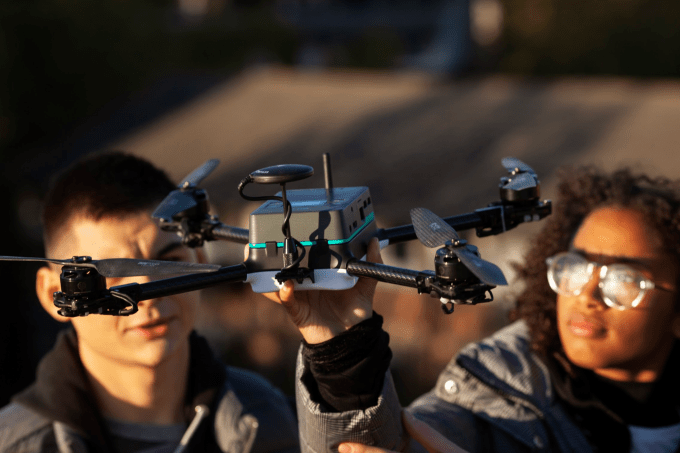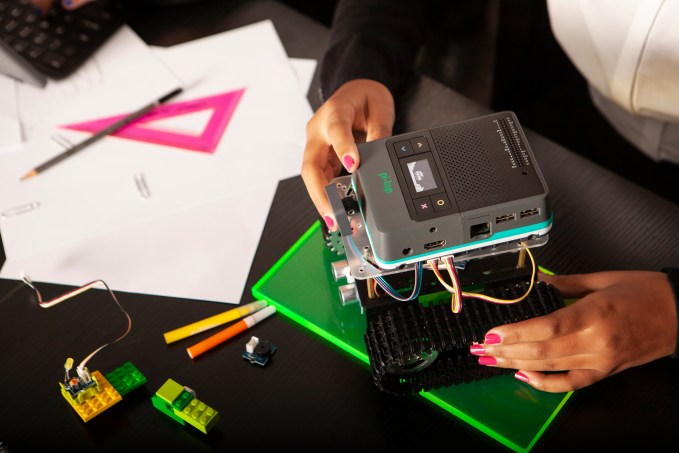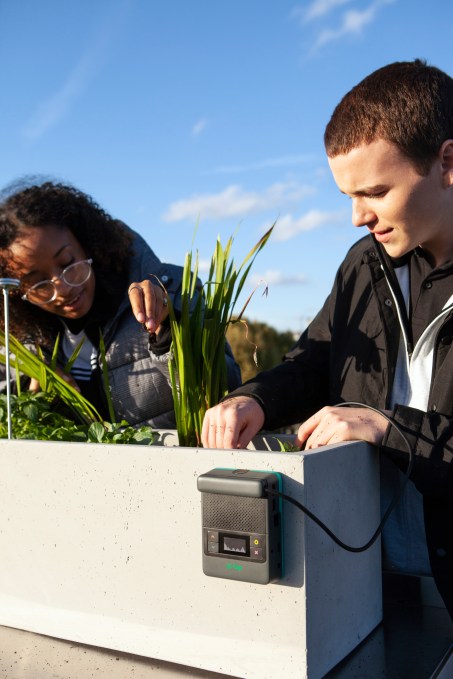Startups
pi-top’s latest edtech tool doubles down on maker culture

London-based edtech startup, pi-top, has unboxed a new flagship learn-to-code product, demoing the “go anywhere” Pi-powered computer at the Bett Show education fare in London today.
Discussing the product with TechCrunch ahead of launch, co-founder and CEO Jesse Lozano talked up the skills the company hopes students in the target 12-to-17 age range will develop and learn to apply by using sensor-based connected tech, powered by its new pi-top 4, to solve real world problems.
“When you get a pi-top 4 out of the box you’re going to start to learn how to code with it, you’re going to start to learn and understand electronic circuits, you’re going to understand sensors from our sensor library. Or components from our components library,” he told us. “So it’s not: ‘I’m going to learn how to create a robot that rolls around on wheels and doesn’t knock into things’.
“It’s more: ‘I’m going to learn how a motor works. I’m going to learn how a distance sensor works. I’m going to learn how to properly hook up power to these different sensors. I’m going to learn how to apply that knowledge… take those skills and [keep making stuff].”
The pi-top 4 is a modular computer that’s designed to be applicable, well, anywhere; up in the air, with the help of a drone attachment; powering a sensing weather balloon; acting as the brains for a rover style wheeled robot; or attached to sensors planted firmly in the ground to monitor local environmental conditions.
The startup was already dabbling in this area, via earlier products — such as a Pi-powered laptop that featured a built in rail for breadboarding electronics. But the pi-top 4 is a full step outside the usual computing box.
The device has a built-in mini OLED screen for displaying project info, along with an array of ports. It can be connected to and programmed via one of pi-top’s other Pi-powered computers, or any PC, Mac and Chromebook, with the company also saying it easily connects to existing screens, keyboards and mice. Versatility looks to be the name of the game for pi-top 4.

pi-top’s approach to computing and electronics is flexible and interoperable, meaning the pi-top 4 can be extended with standard electronics components — or even with Littlebits‘ style kits’ more manageable bits and bobs.
pi-top is also intending to sell a few accessories of its own (such as the drone add-on, pictured above) to help get kids’ creative project juices flowing — and has launched a range of accessories, cameras, motors and sensors to “allow creators of all ages to start learning by making straight out of the box”.
But Lozano emphasizes its platform play is about reaching out to a wider world, not seeking to lock teachers and kids to buying proprietary hardware. (Which would be all but impossible, in any case, given the Raspberry Pi core.)
“It’s really about giving people that breadth of ability,” says Lozano, discussing the sensor-based skills he wants the product to foster. “As you go through these different projects you’re learning these specific skills but you also start to understand how they would apply to other projects.”
He mentions various maker projects the pi-top can be used to make, like a music synth or wheeled robot, but says the point isn’t making any specific connected thing; it’s encouraging kids to come up with project ideas of their own.
“Once that sort of veil has been pierced in students and in teachers we see some of the best stuff starts to be made. People make things that we had no idea they would integrate it into,” he tells us, pointing by way of example to a solar car project from a group of U.S. schoolkids. “These fifteen year olds are building solar cars and they’re racing them from Texas to California — and they’re using pi-tops to understand how their cars are performing to make better race decisions.”

pi-top’s new device is a modular programmable computer designed for maker projects
“What you’re really learning is the base skills,” he adds, with a gentle sideswipe at the flood of STEM toys now targeting parents’ wallets. “We want to teach you real skills. And we want you to be able to create projects that are real. That it’s not block-based coding. It’s not magnetized, clipped in this into that and all of a sudden you have something. It’s about teaching you how to really make things. And how the world actually works around you.”
The pi-top 4 starts at $199 for a foundation bundle which includes a Raspberry Pi 3B+,16GB SD card, power pack, along with a selection of sensors and add-on components for starter projects.
Additional educational bundles will also launch down the line, at a higher price, including more add ons, access to premium software and a full curriculum for educators to support budding makers, according to Lozano.
The startup has certainly come a long way from its founders’ first luridly green 3D printed laptop which caught our eye back in 2015. Today it employs more than 80 people globally, with offices in the UK, US and China, while its creative learning devices are in the hands of “hundreds of thousands” of schoolkids across more than 70 countries at this stage. And Lozano says they’re gunning to pass the million mark this year.
So while the ‘learn to code’ space has erupted into a riot of noise and color over the past half decade, with all sorts of connected playthings now competing for kids’ attention, and pestering parents with quasi-educational claims, pi-top has kept its head down and focused firmly on building a serious edtech business with STEM learning as its core focus, saving it from chasing fickle consumer fads, as Lozano tells it.
“Our relentless focus on real education is something that has differentiated us,” he responds, when asked how pi-top stands out in what’s now a very crowded marketplace. “The consumer market, as we’ve seen with other startups, it can be fickle. And trying to create a hit toy all the time — I’d rather leave that to Mattel… When you’re working with schools it’s not a fickle process.”
Part of that focus includes supporting educators to acquire the necessary skills themselves to be able to teach what’s always a fast-evolving area of study. So schools signing up to pi-top’s subscription product get support materials and guides, to help them create a maker space and understand all the ins and outs of the pi-top platform. It also provides a classroom management backend system that lets teachers track students’ progress.
“If you’re a teacher that has absolutely no experience in computer science or engineering or STEM based learning or making then you’re able to bring on the pi-top platform, learn with it and with your student, and when they’re ready they can create a computer science course — or something of that ilk — in their classroom,” says Lozano.

pi-top wants kids to use tech to tackle real-world problems
“As with all good things it takes time, and you need to build up a bank of experience. One of the things we’ve really focused on is giving teachers that ability to build up that bank of experience, through an after school club, or through a special lesson plan that they might do.
“For us it’s about augmenting that teacher and helping them become a great educator with tools and with resources. There’s some edtech stuff they want to replace the teacher — they want to make the teacher obsolete. I couldn’t disagree with that viewpoint more.”
“Why aren’t teachers just buying textbooks?” he adds. “It takes 24 months to publish a textbook. So how are you supposed to teach computer science with those technology-based skills with something that’s by design two years out of date?”
Last summer pi-top took in $16M in Series B funding, led by existing founders Hambro Perks and Committed Capital. It’s been using the financing to bring pi-top 4 to market while also investing heavily in its team over the past 18 months — expanding in-house expertise in designing learning products and selling in to the education sector via a number of hires. Including the former director of learning at Apple, Dr William Rankin.
The founders’ philosophy is to combine academic expertise in education with “excellence in engineering”. “We want the learning experience to be something we’re 100% confident in,” says Lozano. “You can go into pi-top and immediately start learning with our lesson plans and the kind of framework that we provide.”
“[W]e’ve unabashedly focused on… education. It is the pedagogy,” he adds. “It is the learning outcome that you’re going to get when you use the pi-top. So one of the big changes over the last 18 months is we’ve hired a world class education team. We have over 100 years of pedagogical experience on the team now producing an enormous amount of — we call them learning experience designers.”
He reckons that focus will stand pi-top in good stead as more educators turn their attention to how to arm their pupils with the techie skills of the future.
“There’s loads of competition but now the schools are looking they’re [asking] who’s the team behind the education outcome that you’re selling me?” he suggests. “And you know what if you don’t have a really strong education team then you’re seeing schools and districts become a lot more picky — because there is so much choice. And again that’s something I’m really excited about. Everybody’s always trying to do a commercial brand partnership deal. That’s just not something that we’ve focused on and I do really think that was a smart choice on our end.”
Lozano is also excited about a video the team has produced to promote the new product — which strikes a hip, urban note as pi-top seeks to inspire the next generation of makers.
“We really enjoy working in the education sector and I really, really enjoy helping teachers and schools deliver inspirational content and learning outcomes to their students,” he adds. “It’s genuinely a great reason to wake up in the morning.”
-

 Entertainment7 days ago
Entertainment7 days agoOpenAI’s plan to make ChatGPT the ‘everything app’ has never been more clear
-

 Entertainment6 days ago
Entertainment6 days ago‘The Last Showgirl’ review: Pamela Anderson leads a shattering ensemble as an aging burlesque entertainer
-

 Entertainment7 days ago
Entertainment7 days agoHow to watch NFL Christmas Gameday and Beyoncé halftime
-

 Entertainment5 days ago
Entertainment5 days agoPolyamorous influencer breakups: What happens when hypervisible relationships end
-

 Entertainment5 days ago
Entertainment5 days ago‘The Room Next Door’ review: Tilda Swinton and Julianne Moore are magnificent
-

 Entertainment4 days ago
Entertainment4 days ago‘The Wild Robot’ and ‘Flow’ are quietly revolutionary climate change films
-

 Entertainment4 days ago
Entertainment4 days agoMars is littered with junk. Historians want to save it.
-

 Entertainment4 days ago
Entertainment4 days agoCES 2025 preview: What to expect

















